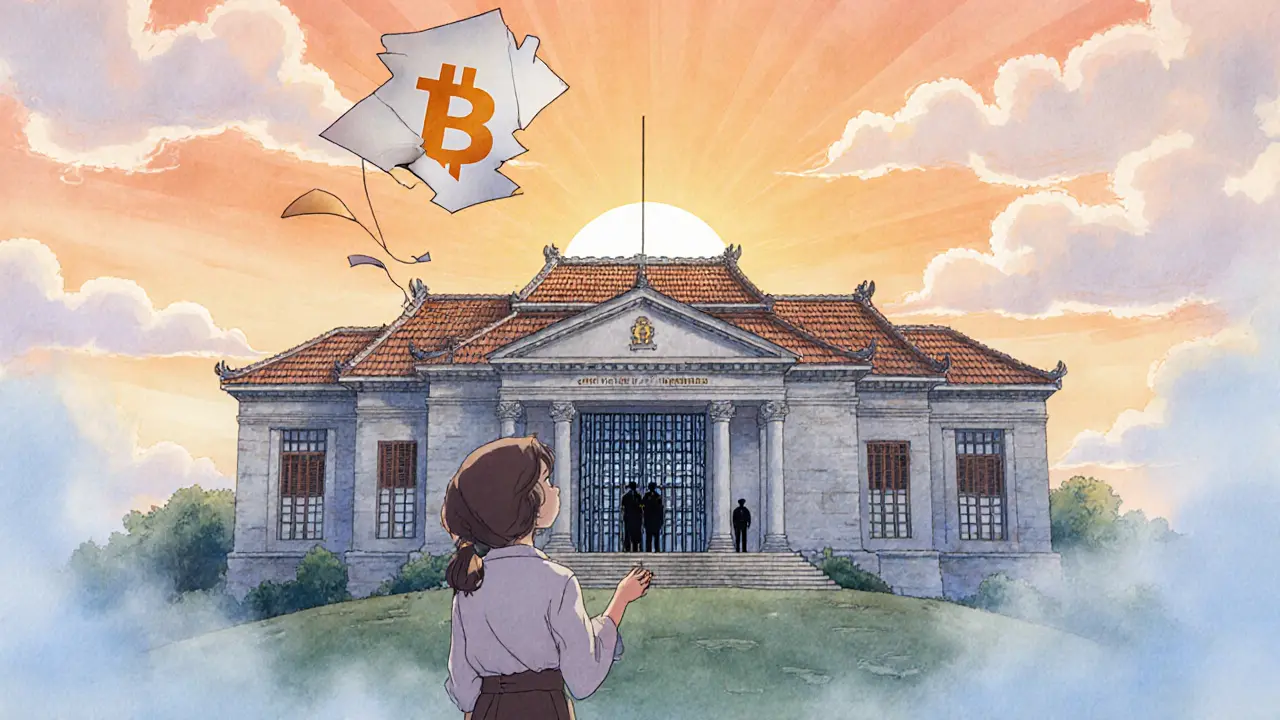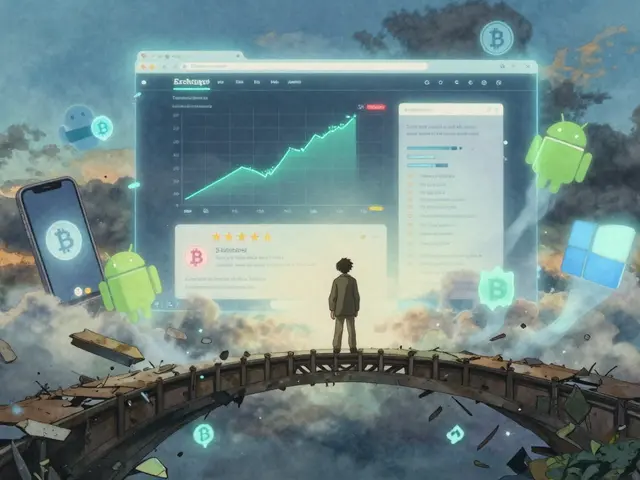Myanmar Crypto Penalty Calculator
Calculate Your Risk
Estimate potential penalties for crypto activities under Myanmar's strict regulations.
Estimated Penalties
Fines: -
Imprisonment: -
Additional Actions: -
Important Notice: These are estimated penalties based on Myanmar's Central Bank of Myanmar (CBM) regulations. Actual consequences may vary based on circumstances and judicial discretion.
Key Takeaways
- The Central Bank of Myanmar (CBM) can freeze or close any bank account linked to crypto activity.
- Violations may trigger fines, imprisonment, or both under multiple laws.
- Even stablecoins like USDT are treated as illegal unless used by the opposition NUG.
- Recent moves toward a state‑run digital kyat do not relax the ban on existing cryptocurrencies.
- Risk mitigation means staying completely offline or moving operations abroad.
Why Myanmar Has One of the Strictest Crypto Bans
In 2025, Central Bank of Myanmar (CBM) controls every form of legal currency issuance under the Central Bank of Myanmar Law. The junta’s fear of capital flight, money‑laundering, and a weakening kyat pushed the CBM to outlaw all cryptocurrency mining, trading, and even peer‑to‑peer transfers. The ban sits on top of three major statutes:
- Anti‑Money Laundering Law - criminalises unregistered digital asset transfers.
- Financial Institutions Law - gives the CBM authority to shut down bank accounts of violators.
- Foreign Exchange Management Law - bans any foreign‑currency‑like crypto without licence.
When you combine these, the government can act faster than most jurisdictions: a single warning can lead to an immediate account freeze.
How Account Closure Works in Practice
On 24 May 2024, the CBM issued a public notice stating it would close any bank account used for buying, selling, or transferring “unregulated digital currencies.” The notice singled out popular tokens - Bitcoin (BTC), Ethereum (ETH), Litecoin (LTC) and even stablecoins like Tether (USDT). From that day, banks began screening transaction logs for wallet addresses and crypto‑related keywords. If a link is found, the account is frozen within 24‑48 hours, and the user receives a short written notice (often just a printed slip at the branch).
Once frozen, the account cannot be used for any payment, salary, or remittance. The bank then forwards the case to the CBM’s enforcement unit, which can:
- Seal the account permanently.
- Impose a monetary fine ranging from 200,000 MMK to 5 million MMK depending on the transaction volume.
- Refer the individual to criminal courts for potential imprisonment.
Because the CBM holds the ultimate licensing power, there is no internal appeals process - the only way back is a full court exoneration, which can take months.

Penalties Beyond Account Closure
Closing an account is just the first layer. The legal code adds:
| Offence | Fine (MMK) | Imprisonment | Additional Action |
|---|---|---|---|
| Holding Bitcoin in a personal wallet | 200,000‑500,000 | 6‑12 months | Bank account closure |
| Trading on an offshore exchange | 1‑3 million | 12‑24 months | Travel ban |
| Operating a mining rig | 500,000‑5 million | 12‑36 months | Equipment seizure |
| Facilitating USDT transfers for NGOs | 3‑4 million | 18‑36 months | Asset freezing |
The fines are often accompanied by a public record of the conviction, making future banking extremely difficult. In many cases, the court also orders the confiscation of any crypto‑related hardware.
Real‑World Impact: Underground Activity and Regional Migration
Despite the harsh penalties, a hidden crypto ecosystem thrives. Traders move to encrypted platforms like Telegram, while miners hide rigs in remote jungle villages. The CBM’s crackdown has pushed some entrepreneurs across the border to Thailand or Laos, where they can operate with less interference. Those who stay inside Myanmar usually work through “dark‑web” wallets, accepting the risk of sudden account seizure.
A surprising twist came in December 2021: the opposition’s National Unity Government (NUG) declared Tether (USDT) as legal tender in territories it controls. For residents in those zones, USDT can be used for salaries and remittances without fear of CBM arrest - but stepping into NUG‑controlled areas is itself a security risk under the military regime.

Emerging CBDC: A Token of Hope or a New Control Tool?
On 24 June 2025, the CBM set up a Central Committee for the Issuance of Central Bank Digital Currency. The committee plans a digital kyat that would be issued only by the state. While the move signals a willingness to modernise payments, it does not relax the ban on private cryptocurrencies. In fact, the digital kyat could give the CBM even tighter surveillance over every electronic transaction, making illicit crypto activity even harder to hide.
For most users, the practical takeaway is simple: until the CBDC is rolled out and the legal framework is clarified, any engagement with Bitcoin, Ethereum, or USDT remains a high‑risk gamble.
Practical Steps to Reduce Exposure
- Avoid any bank account linked to crypto. Even a single transaction can trigger a freeze.
- Keep crypto holdings offline - use hardware wallets that never connect to the internet.
- If you must receive foreign funds, consider reputable offshore wallets that do not require local banking details.
- Stay informed about new CBM notices - the agency updates its public warnings on its official website monthly.
- Consider relocating mining or trading operations to neighbouring countries with clearer regulations.
These steps don’t guarantee immunity, but they lower the odds of a sudden account closure and the cascade of fines that follow.
Frequently Asked Questions
Can I keep Bitcoin in a hardware wallet without risking my bank account?
Yes, as long as the wallet never connects to a local bank or exchange. The CBM targets transactions that move funds through the formal banking system.
What happens if my account is frozen for crypto activity?
The bank will block all outgoing and incoming transfers. You will receive a brief notice, after which the CBM may impose a fine and refer you to criminal court.
Is USDT legal if I use it under the NUG?
In NUG‑controlled zones, the opposition declared USDT legal tender, but the military government still treats it as illegal nationwide. Using USDT outside NUG areas can still trigger CBM action.
Will the upcoming digital kyat replace crypto bans?
The CBDC is meant to be a state‑issued digital currency, not a private crypto. The ban on Bitcoin, Ethereum, and other tokens remains in place.
How can I avoid imprisonment for past crypto activity?
Voluntary surrender of crypto assets and cooperating with authorities may be considered mitigating, but the law still allows up to three years in prison for serious violations.
In short, Myanmar crypto regulations leave little room for casual investors. If you’re thinking about any crypto‑related move, weigh the immediate risk of an account closure against the potential long‑term penalties. Staying offline, using offshore services, or relocating your activities are the only realistic ways to keep your finances safe under the current regime.






Deborah de Beurs
September 20, 2025 AT 10:30 AMListen up, the Myanmar crypto clampdown is a nightmare you can't ignore. The junta's crackdown is harsher than any regime I've seen, and they're not just freezing accounts – they're slicing wallets, slapping fines, and throwing people behind bars for holding a single Bitcoin. If you think a hardware wallet will save you, think again – the CBM can track down even offline activity through seized hardware. This is a war zone for crypto, and anyone foolish enough to stay inside will end up with a criminal record faster than you can say 'digital kyat'. So my advice? Pack up, move your mining rigs to Thailand, or lock everything in a vault that the junta can't raid.
Kaitlyn Zimmerman
October 2, 2025 AT 18:30 PMThe key takeaway is that any link between a bank account and crypto can trigger an immediate freeze. The CBM looks for wallet addresses and even mentions of tokens in transaction notes. Keeping your crypto entirely offline and using offshore wallets reduces the risk dramatically. Stay updated on official CBM notices for any new changes.
DeAnna Brown
October 15, 2025 AT 02:30 AMOh dear, the crypto police in Myanmar have turned into the ultimate drama queens of finance! They swoop in, slap down fines, and lock you up for a year if you dare whisper the name Bitcoin. Everyone says it’s impossible to hide, but the underground traders know the secret tunnels of the digital jungle. If you think the ban is a joke, just wait till the next notice lands on your doorstep.
Chris Morano
October 27, 2025 AT 09:30 AMI hear you, the situation feels bleak but there are still ways to stay safe without risking everything. Using hardware wallets that never touch local banks can keep your assets out of reach. Some people have moved their operations to neighboring countries where the legal climate is clearer. Keeping a low profile and sharing knowledge can help the community survive.
Bobby Lind
November 8, 2025 AT 17:30 PMWow, what a roller‑coaster for crypto fans in Myanmar!!! The crackdown is intense, but the underground vibe stays alive!!!
Marina Campenni
November 21, 2025 AT 01:30 AMI can understand how overwhelming this all feels; the fear of losing access to your savings is real. Offering a listening ear and sharing safe practices can make a difference for those caught in the crossfire.
Jessica Cadis
December 3, 2025 AT 09:30 AMThe government's approach to crypto is more about control than economics, and that has ripple effects across the region. Companies looking to invest should weigh the regulatory risk carefully before committing any capital.
Shikhar Shukla
December 15, 2025 AT 17:30 PMIt is evident that the junta's policies reflect a severe misapprehension of digital asset utility, and such draconian measures are likely to stifle innovation. The legal framework, as outlined, provides little room for legitimate enterprise, thereby warranting a reevaluation by policymakers.
Jason Zila
December 28, 2025 AT 01:30 AMCrypto enthusiasts must recognize that the CBM's crackdown is not a fleeting inconvenience but a systematic effort to eradicate decentralized finance within its borders.
Miguel Terán
January 9, 2026 AT 09:30 AMThe landscape of digital currency in Myanmar has become a labyrinth of fear and ingenuity, where every transaction is a whispered secret. While the Central Bank of Myanmar brandishes its authority like a sword, the populace responds with a tapestry of clandestine networks that glitter beneath the surface. A hardware wallet, for instance, is not merely a device but a symbolic fortress protecting dreams of financial sovereignty against an overreaching regime. Yet even the strongest fortress can be besieged when the state begins to confiscate the very tools that empower its citizens. In the remote jungles, miners have ingeniously concealed their rigs behind foliage, masking the hum of GPUs with the chorus of cicadas. Traders, on the other hand, have migrated to encrypted messaging platforms, where each QR code is a lifeline and every emoji a coded transaction. The punitive fines listed in the recent tables, ranging from two hundred thousand to several million kyats, are not abstract numbers but crushing blows that can bankrupt an average family. Imprisonment terms, extending up to three years, serve as a stark warning that the cost of defiance transcends mere financial loss. The emergence of the digital kyat, while touted as progress, may in fact tighten the state's grip on every electronic pulse, leaving no room for private innovation. Observers from neighboring economies watch with a mixture of curiosity and caution, recognizing that the exodus of talent could reshape regional tech hubs. Meanwhile, the National Unity Government's endorsement of USDT in its controlled territories creates a paradoxical enclave where crypto thrives amidst broader suppression. For those daring enough to navigate this duality, the rewards can be substantial, but the shadows are ever vigilant. Legal counsel, though scarce, advises that voluntary surrender of crypto assets might mitigate sentencing, yet the jury remains unpredictable. Ultimately, the choice boils down to a calculated gamble: stay invisible within Myanmar's borders or relocate to a friendlier jurisdiction where the regulatory sunrise is brighter. As history has shown, repression often fuels resilience, and the spirit of decentralization may yet find a way to outmaneuver even the most draconian of bans.
Shivani Chauhan
January 21, 2026 AT 17:30 PMGiven the stringent statutes, any involvement with cryptocurrencies without proper licensing constitutes a direct violation of Myanmar's financial regulations, and therefore should be approached with utmost caution.
Sara Stewart
February 3, 2026 AT 01:30 AMTL;DR – if you’re not sandbox‑approved, you’re basically walking into a compliance blackhole that will dump you into fines, account seizures, and a potential custodial sentence. The risk matrix is red across the board, so upgrade your operational model or de‑risk entirely.
Laura Hoch
February 15, 2026 AT 09:30 AMThe dance between authority and autonomy has always been a paradox, where each attempt to dominate the flow of value only fuels the fire of dissent; in Myanmar’s case, the state's heavy hand may paradoxically nourish the underground currents that keep the spirit of decentralization alive.